‘Campers have S’more fun!’
Yes, they do! Camping is an amazing way to get close to nature and simultaneously refresh and recharge yourself. The camping experience is greatly enhanced when the food is delicious and the cooking process is smooth. The mood and energy of the entire camping trip significantly depend upon the timely availability and quality of meals. Hot meals after hours of outdoor activities just seem to taste different.
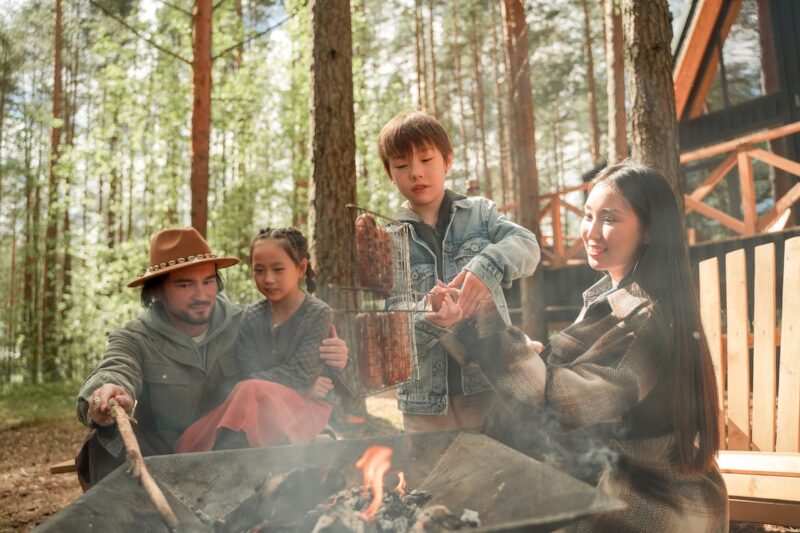
Image Source: Pexels
Camping cooking is an art. It is like creating a potion – it could have amazing results or if not done right, it could be disastrous. If you want the outcome of your cooking to be amazing each time during a camping trip, try to avoid these mistakes:
Mistake#1: No Planning and Preparation
Planning is essential for all kinds of camping activities, but especially for cooking. When it comes to camping cooking, no planning and inordinate planning are both problematic. Although, among the two, not planning is the greater mistake. Planning too much can result in inconvenience and frustration when things don’t go as planned.
However, when you set out without plans (and with too few random ingredients and tools), cooking and meal times can turn into pure chaos. During cooking, you may realize that you are missing important ingredients. Purchasing from a nearby store may or may not be an option. Even if it is possible to purchase ingredients, it could lead to unnecessary delays. Managing hunger pangs and the related mood variations of the camping group may become difficult.
Before setting out on a camping trip, you need to draw up meal plans, purchase the ingredients and pack the tools and equipment. This will ensure that you have the right ingredients, tools, and equipment at the right time. If you are generally good at planning, put your skills to use and your camping group will appreciate it.
Mistake#2: Trying Out Elaborate Gourmet Recipes
Elaborate and gourmet recipes often require numerous ingredients and tools for preparation.
When you go camping, you will be taking along with you limited tools and ingredients. If you decide to prepare elaborate recipes, you might have to carry extra stuff along with you. You may miss some ingredients, and some ingredients may require extensive preparation.
On a camping trip, opt for simple and easy-to-prepare recipes that require fewer ingredients and less time to cook. While cooking is enjoyable, you don’t want to spend the major part of your day doing that. Before your trip, collect and practice some simple camping recipes. Complicated recipes and experimentation are more suitable for leisure time at home.
Mistake#3: Getting Distracted while Cooking
This won’t be intentional, but it’s still a common mistake. You will be in a picturesque natural setting and surrounded by family or friends. A captivating story or a rare bird could capture your attention. If you get distracted and forget about the food that you are cooking, it could lead to food getting burnt and a waste of energy and limited ingredients.
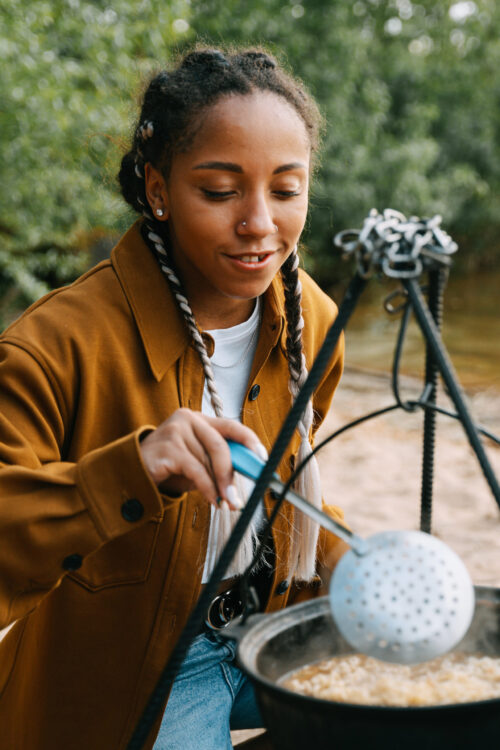
Image Source: Pexels
Even if the food does not get burnt completely, its flavor and texture may undergo undesirable changes. For instance, when you cook a lobster, you need to be mindful of the time. Otherwise, it will get overcooked and its meat will turn rubbery, dry, and unappealing. It’s a good idea to enlist the help of others while cooking and communicate with them if you are going to step away for a little while.
Mistake#4: Relying Solely on a Campfire
Many first-time campers commit this mistake. Although campfire cooking is a must-try and must-learn experience, depending on the campfire alone for cooking your meals on a camping trip is a mistake. Besides, a campfire is not a recommended option on dry, windy days.
Plenty of cooking gadgets are available in the market these days. Get some that will be suitable for your camping cooking requirements. If you get confused due to the multitude of options, at least get a basic 2-burner stove (propane). You may need more cooking equipment if you are going camping as a large party. Before setting out for camping, clean and check your cooking equipment to make sure everything works well.
Mistake#5: Disregarding Food and Fire Safety Rules and Regulations
It is a huge mistake to disregard food and fire safety rules and regulations when you are out camping. These rules apply wherever you go, and they are in place for everyone’s best interests. Take as much and more precautions for food and fire safety as you do at home.
Improperly handled or stored food could result in people getting sick. Such a situation could potentially ruin the entire trip or bring it to a premature and abrupt end. Simple food safety measures can help avoid such a scenario. Ensure that cold food items remain cold and hot foods remain hot. Washing hands before and after handling food goes without saying. Make sure to keep raw foods separate. Also, ensure that the surfaces you use to prep your ingredients are clean. Additionally, you need to make sure that food is getting cooked to the right temperature.
If you intend to cook with a campfire, check the rules of the camping area to see if campfires are permitted. Cook using a small fire that can be easily controlled. Light a campfire at a reasonable distance from all structures that can potentially catch fire. Be mindful of overhanging tree branches. Be alert and watchful as your food cooks and put out the fire thoroughly before moving away.
Before You Go
On a camping trip, your activity levels will be higher. So make sure you cook sufficient amounts of food to meet your calorie requirements and nutritional needs. You need the energy to make the most of your trip.
Remember, there is a difference between preparing meals at home and cooking on a camping trip. The setting is different, the equipment is different and the techniques will also vary. When you understand, celebrate, and learn to work around this difference, camping cooking will be more enjoyable.
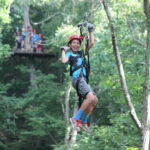
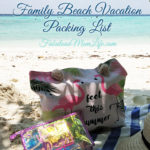

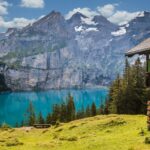
Leave a Reply